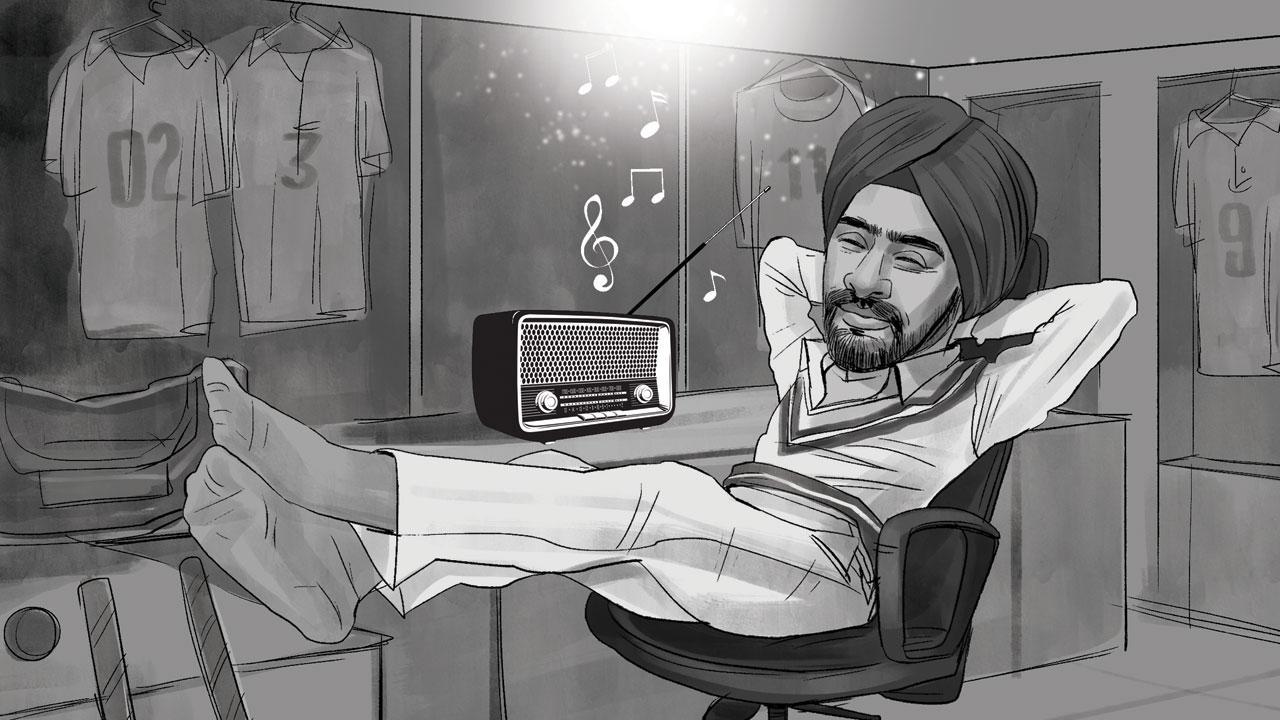Bishan Bedi was a gentle breeze in a time of noisy tsunamis… a grandfather clock, in the time of TikToks.

Illustration/Uday Mohite
 It was a moment, last Sunday, India vs New Zealand, as Virat carried us to victory, on his shoulders, bounding up and down, a man machine run chaser, when he took off his helmet, in triumph, I had an insight, 80 per cent of our team looks similar—all Kohli acolytes… identical beards, similar haircuts, worked -out bodies, aggressive street fighting dispositions… KL Rahul, Jasprit, Jaddu, Siraj, Shreyas, Shami—Cut from the same cloth, in the same shadow.
It was a moment, last Sunday, India vs New Zealand, as Virat carried us to victory, on his shoulders, bounding up and down, a man machine run chaser, when he took off his helmet, in triumph, I had an insight, 80 per cent of our team looks similar—all Kohli acolytes… identical beards, similar haircuts, worked -out bodies, aggressive street fighting dispositions… KL Rahul, Jasprit, Jaddu, Siraj, Shreyas, Shami—Cut from the same cloth, in the same shadow.
ADVERTISEMENT
And in the middle of this frenzy, the circus that is the World Cup, the intense noise, icons-turned- commentators venting, Bishan Singh Bedi, passed away. The Sardar of Spin, perhaps the greatest left arm spinner of all time, breathed his last. A unique man, the Sikh, dressed in white, sporting either a light blue or light pink turban, clapping his hands, that relaxed action, allowing him to bowl all day, had left the “building”.
Bishan Bedi was a gentle breeze in a time of noisy tsunamis… a grandfather clock, in the time of TikToks.
And it seemed like the sport had suddenly quietened down, bereft of the insanity, we had returned to a bygone era, of radio commentary, and black and white images—of Indian cricketers who stamped individual identities, not spoilt by Insta, and IPL or inane ad commercials or inane interviews or insane wealth.
We all “timed out” to mourn the death of India’s most colourful, controversial, player wearing his heart on his sleeve, as he rolled them up to bowl, to outfox another hapless batsman. It is ironic that Bishen Bedi was so outspoken, so transparent while he let his bowling silently do the talking. Bishan Bedi was an unhurried man.
Also read: Familial love gone too far
Those 1970s teams I loved to watch, first at the CCI, then at the newly opened Wankhede Stadium. I used to open the bowling for school, so Lillee and Imran were my heroes, white flannels, red streaks from the shining of the ball, swagger seam and swing going hand in hand. But we never had fast bowlers in those years, till Kapil Dev popped up—my obsession was the quartet of spin bowlers, Chandra, Prasanna, Venkat and Bedi—add to that Farokh Engineer from Dadar Parsi Colony, behind the stumps, Ekki Solker at short leg, Sunny Gavaskar in the slips, and Abid Ali and you had a powerful performing Lagaan outfit. This team was bookended by Wadekar and Sardesai in the early 1970s, and Jimmy Amarnath and Gundappa Vishwanath later. But it was the Bedi-Prasanna relationship that always magnetised me, nagging left arm spin at one end, biting right hand off spin at the other—the batsmen had no respite. Bedi fielding at mid-off as Pras bowled, and then sprinting towards each other having plotted the end of another batsman.
What fascinated me was these gents hardly played together, only Test series to Test series, in a non ODI, T20 era, but they fused, first under Wadekar, then Pataudi, and finally Bedi himself.
For every series that India played in Bombay, I managed a ticket directly behind the bowler, watching intently behind binoculars, Bedi especially, that utterly relaxed action, as he dipped into an invisible bag of tricks, the arm ball, the googly, the Chinaman, the slower one, the faster one, the wrong ’un, the flight, the turn, the guile, he had everything for any kind of condition, at home and overseas.
Two moments will stay with me forever—
1. Sharmila Tagore consoling Kapil Dev at the funeral, Bedi believed that Pataudi was his mentor and captain who truly understood him.
2. Intikhab Alam, the Pakistani cricketer and Bedi’s great friend singing Louis Armstrong’s “What a Wonderful World” at the Kartar Sahib Gurdwara, and the wheelchair-bound Bishan’s laughter that followed.
Alam said this about his friend: “People always talk about his action, and how great a bowler he was. I used to tease him ‘Oye Sardar tu bowling karta hai ya Ghalib ke sher sunata’. Such a beautiful action he had.”
Rest well, oh Sultan of Spin. I’m guessing your lack of diplomacy will rule the heavens.
Rahul daCunha is an adman, theatre director/playwright, photographer and traveller. Reach him at rahul.dacunha@mid-day.com
 Subscribe today by clicking the link and stay updated with the latest news!" Click here!
Subscribe today by clicking the link and stay updated with the latest news!" Click here!







